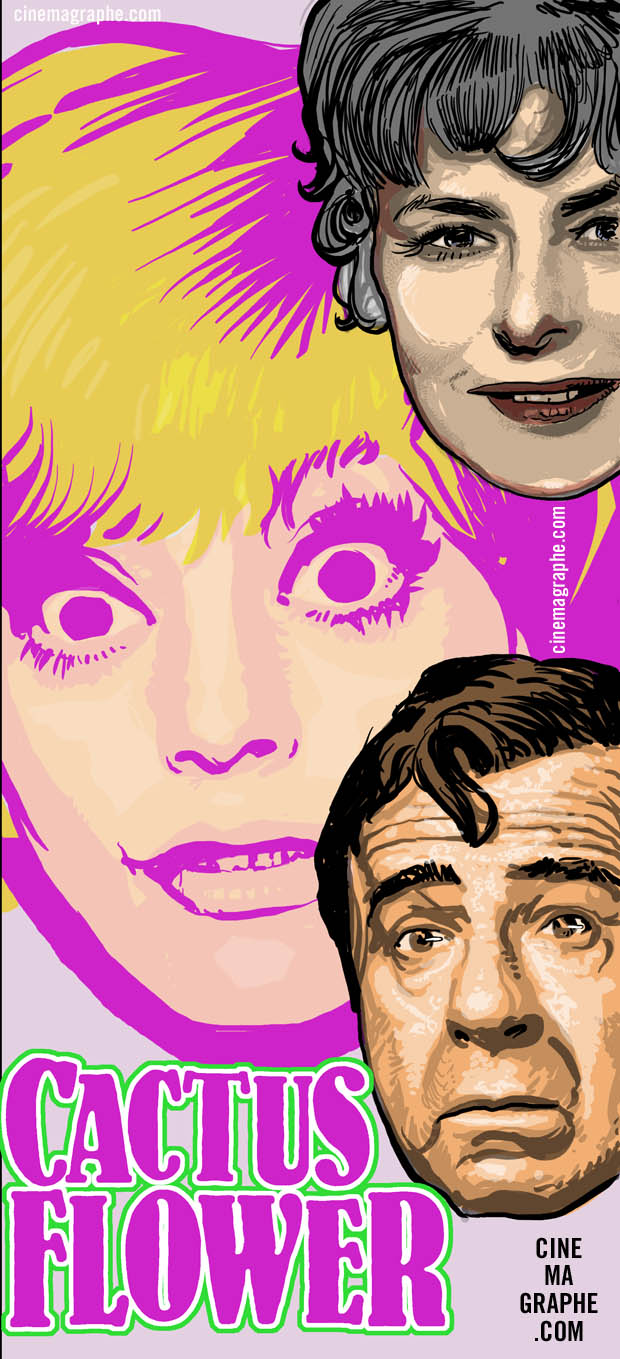Cactus Flower – 1969

Fast Review: Cactus Flower – 1969
At the start of Cactus Flower, a prone Goldie Hawn is on her couch as her tiny apartment fills with gas from her tiny oven. Like a sacrifice to a shrine she positions herself with arms crossed below a large framed photo of Walter Matthau, who has just broken a dinner-date with her, and she lays still and breathes in the killing fumes. Her suicide goes awry when her neighbor, unsuccessful playwright Julian (played by Rick Lenz), sniffs the gas out in the hall, and unable to get through the door, smashes out one of her windows to climb in and turn the gas off. He then administers mouth-to-mouth respiration to the passed-out young woman which turns into a heated kissing session until Hawn's character snaps awake, realizing these aren't middle-aged Walter Matthau lips!
Goldie Hawn was in her early twenties when Cactus Flower was made, but at times she looks more like a teenage Oliver Twist waif come to hippy-1969 life and not a young woman that Walter Matthau is having an extra-marital affair with. As a "waif" her appearance makes middle-aged Matthau's philandering dentist seem (unintentionally, I suppose) extra predatory and certainly less than sincere as we watch the relationship between the two progress with his coming-and-goings from her very small New York City apartment. The actual extra-marital affair, though, is fictitious. Matthau's character doesn't have wife or children, using the story of them as a handy way to stave off commitment with the young women he philanders (Goldie Hawn's character is the only one we actually see in Cactus Flower, but there are others we learn of through telephone calls.)
Ingrid Bergman is sort of the "main character" in Cactus Flower though this doesn't become evident until later and most of the attention by director Gene Saks' camera is aimed at the young Goldie Hawn. Bergman is the office manager at Matthau's character's dental practice, with a small potted cactus on her desk, and she gets looped into a scheme of Matthau's to do two things: first to convince Hawn's character she is the (fictitious) wife Matthau has used as a shield, and (2) convince her also that the "divorce" they're getting is amicable but also worthwhile, because, as Hawn's character says, "I don't want to be a housebreaker," and all of this screwball chicanery is because Matthau's guilt is strong enough to make him want to "do right" by the devoted, large-eyed Goldie Hawn. To do this he must kick the phantom wife out of the picture first to please Hawn's character's appreciation of propriety.
The script for Cactus Flower was written by I. A. L. Diamond, but the film is based on the Broadway play of the same name by Abe Burrows, which in turn was adapted from the French play "Fleur de cactus" by Pierre Barillet and Jean-Pierre Gredy, and it is a well-machined story that furnishes opportunity for many one-liners and arch comments to have a place to breath, and as a comedy, Cactus Flower does all that and more, letting Bergman's tightly-uniformed (a visual clue of her repression) to finally let-loose and "live," 1969-style. Why Matthau isn't nursing a dozen STDs and why is Goldie Hawn's character so gullible, and why is Rick Lenz a fairly accurate photocopy of a young Jimmy Stewart, well none of that is explained, but as a retooled-screwball comedy for a different era of go-go boots and psychedelia, Cactus Flower excels.
What's Recent
- Grand Exit - 1935
- Island of Desire - 1951
- Road to Morocco
- The Devil and Miss Jones - 1941
- Sinners - 2025
- Something for the Boys - 1944
- The Mark of Zorro - 1940
- The Woman They Almost Lynched - 1953
- The Cat Girl - 1957
- El Vampiro - 1957
- Adventures of Hajji Baba – 1954
- Shanghai Express 1932
- Pandora's Box – 1929
- Diary of A Chambermaid - 1946
- The City Without Jews - 1924
- The Long Haul
- Midnight, 1939
- Hercules Against the Moon Men, 1964
- Send Me No Flowers - 1964
- Raymie - 1964.
- The Hangman 1959
- Kiss Me, Deadly - 1955
- Dracula's Daughter - 1936
- Crossing Delancey - 1988
- The Scavengers – 1959
- Mr. Hobbs Takes A Vacation - 1962
- Jackpot – 2024
- Surf Party - 1964
- Cyclotrode X – 1966
Original Page July 1, 2024